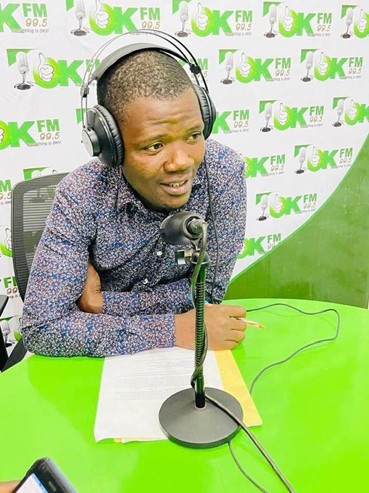The authors of the book, ‘George Weah-the Dream, the Legend the Rise to Power’ said the information in the book was based on ‘thorough research from various sources…’ and one would have thought that since the central character was still living and a leader of Liberia, they could have at least extended a courtesy to him to add his voice to the material.
That the authors felt the need to exclude him from the information they sought for his life’s story is not only unfair, but it demonstrated a lack of respect to Mister Weah and the position he holds as the President of Liberia.
As is often stated every politician or celebrity’s life is in the public domain, meaning anyone can gather information about you without making it their duty to get your consent.
However, when the information is about your character that could affect your standing in your society, then the person that the story is about as a matter of common sense must be contacted for his or her consent.
In an event that such a contact was made and the person involved decided not to honor your request, then, of course, you have done your duty and you must state in your work that you made the contact, but the individual refused to honor your request.
When also, as the present case suggests the main character is the President of Liberia at the time of writing, then the onus is on the writers to seek his attention and let him agree with the content of the material about his life. This is no fictional story but a story about the life of a man who has survived many challenges that are worth writing about.
So far, the authors of the above book failed to get Mr. Weah’s consent on information about his life that they gathered from other sources, including, family members, journalists, FIFA Magazine, Football Magazines, hundreds of online media, and video footage containing interviews with George Weah, friends, fans, various coaches, etc.”
With such efforts to gather information about Mr. Weah, the only person the two authors failed miserably to contact was the man the story was about: Mr. George Weah.
The obvious question is: Why? Another is what was the motive for not contacting Mr. Weah, President of Liberia for such an undertaking?
Why give yourself the headache for information that Mr. Weah could have easily made available for the project?
So, the authors went ahead and completed their research and went to work.
One major question is: Why is George Weah’s life story so fascinating? Another is why does his life story have such a strong appeal to, not only Liberians, but the world also?
It is this: it is how a child born and raised in the lowliest of the communities rose to become a superstar of the world in his chosen field of interest to tell the world that no matter how or where you were born, with dedication, commitment and support and a great deal of luck, you could overcome any adversity.
It was no wonder that the United Nations Children’s Fund (UNICEF), saw the opportunity to appoint Mister Weah its Goodwill Ambassador.
It was to drum the message to the world with the millions that are poor, facing a bleak future that there is hope still elsewhere in the dungeons of poverty. The Weah story, like several others, is to serve as an inspiration.
And now that Mr. Weah had also overcome several oppositions in his native country and had been elected as its president, his story, as the authors came to realize, has more to offer the world. A world that has too much hopelessness!
Sadly, the authors, while trying to do justice to Weah’s journey he traveled so far from Gibraltar to Yaounde and France, wasted much time on third-party information about some unnecessary activities that they could not give proof to. Since the person involved is the President of Liberia, certain alleged claims should have been verified and get Mister Weah’s consent. Why this is necessary is because the authors were not writing fiction as pointed out earlier but the life of a man who has worked his way through fire to achieve his status in life, of which at least four million Liberians agree.
While facts are sacred and comments are free, the co-authors should have realized that whatever they wrote about Mister Weah, whether true or not, would have implications. And since both are Liberians, they know that Liberia is a country where rumors can grow like weeds. You can get people to say anything about anyone.
Today, the world is sensitive and may react negatively to any leader who has a history of abusing any section of society. There are organizations and governments that may not deal with any leader because of their abuses of people in the past.
Hence, they should have been extremely careful on issues about women who were allegedly involved in Mister Weah’s life. I was surprised to read what the authors claimed about Mister Weah’s role with women. My surprise was that these two Liberian men had the audacity to be the first to cast the first stone about Weah’s role with women.
Can anyone believe that a man who was raised by a woman of faith turn up abusing women later in life?
Many Liberian men reading my statement above should look down into their hearts and reflect on how they treat their women as well as how other Liberian women are treated. The negative treatment of Liberian women as it is known in Liberia is a national crisis. It was not George Weah whose successes originated with the abuse of Liberian teenage girls and other women if we must treat the claim by the authors with certainty.
But the most horrible description in any literature I have come to know is about Mister Weah’s wife. Co-authors Emmanuel Clarke and Isaac Vah Tukpah wrote on Page 137 (Chapter 13), “In confidence, he told close friends that…” here the authors were quoting what they claimed Minister Weah allegedly told friends in confidence. So, if he allegedly told close friends, why Emmanuel Clarke and Isaac Vah Tukpah did not seek confirmation from him?
Since the authors were not brave enough to divulge the names of those third parties (They Say) what Mister Weah allegedly “told them in confidence,” if we must believe them, on what basis did Clarke and Tukpa stand on to reveal it in their book?
As President of Liberia, it is Mr. Weah’s duty to protect all Liberians, and therefore receiving information that he allegedly dehumanized some women should have been critically investigated.
Like Weah, we are not saints. And since Clarke and Tukpa had been brave enough to cast the first stone at a young man that providence and several Liberians, along with his own determination, made successful is not only tragic but a poor reflection of the authors’ understanding of human nature.
It is sad because rather than considering the book as a classic document to inspire and uplift thousands of Liberians, the book is looked upon now as a negative document that sought to destroy a young man whose life is full of hope, for the millions who roam the streets of Monrovia and other towns, who consider Weah’s ascend to power a great miracle to happen in Liberia.
Weah may be the worst creature as the book struggled to portray to the world, but four million Liberians, both men, and women don’t think so. With his humbleness, they look up to him as the man who embodies their hope, their dreams, and expectations for a better Liberia, no matter what his critics say about him. Every Liberian has the right to criticize the government and they must do it, recognizing that it is a national duty to do so.
Written By Omari Jackson







